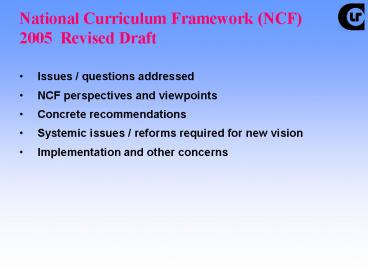National Curriculum Framework NCF 2005 Revised Draft - PowerPoint PPT Presentation
1 / 20
Title:
National Curriculum Framework NCF 2005 Revised Draft
Description:
National Curriculum Framework (NCF) 2005 Revised Draft. Issues / questions addressed ... Curriculum enrichment going beyond textbooks ... – PowerPoint PPT presentation
Number of Views:11293
Avg rating:5.0/5.0
Title: National Curriculum Framework NCF 2005 Revised Draft
1
National Curriculum Framework (NCF) 2005 Revised
Draft
- Issues / questions addressed
- NCF perspectives and viewpoints
- Concrete recommendations
- Systemic issues / reforms required for new vision
- Implementation and other concerns
2
NCF Aims of Education
Based on the Constitutions Vision of India
- Independence of thought and action
- Learning to respond to new situations flexibly
and creatively - Pre-disposition for participation in democratic
processes and social change - Empower all children to learn
3
Distortion of Aims of Education
Learning has become a source of burden and stress
for children
- Textbooks / workbooks
- Information overload
- Incomprehension
- Tests and examinations
4
Correcting Distortions 5 Guiding Principles for
Curriculum Development
- Connecting knowledge to life outside school
- Learning shifts away from rote
- Curriculum enrichment going beyond textbooks
- Making exams more flexible / integrating them
with classroom life - Nurturing a caring identity
5
NCF Learning And Knowledge
The Child as Learner and What Should be Learnt
NCF Perspectives
Commonly Held Views
All children are motivated and capable of
learning Children learn in a variety of
ways Developing capacity for abstract thinking,
reflection and work are most important aspects of
learning Child as a critical learner and
constructor of knowledge Different types of
knowledge as embodied in the traditional
curriculum as well as in the world outside the
school
Not true of large numbers of children Children
learn in limited ways Developing generally only
skills necessary for helping students pass or
excel in examinations Child as passive imbibers
of textbook information and providing set answers
to all questions Knowledge as embodied in
textbooks
6
Childrens Knowledge And Local Knowledge
Local Knowledge is a Rich Source of Learning for
All Children
- Knowledge brought into school - home language
- Integrating the outside world and school
natural environment - Integrating the outside world and school
cultural environment
7
Childrens Knowledge And Local Knowledge
Criteria for Selection of Local Knowledge in
Social Sciences and Language
- Ideals and values enshrined in constitution
- Ethically sound
- Pedagogically imaginative
8
NCF Curriculum Areas
Traditional
Other Areas
- Language
- Mathematics
- Science
- Social Sciences
- Art Education
- Health and Physical Education
- Education for Peace
- Habitat and Learning
9
NCF Language
- Three language formula reaffirmed importance of
home language - Multilingualism as a resource
- Position of English and recommendations
- Achieve basic English proficiency in 8 years of
elementary education within 4 years
10
NCF - Science
What biology can Janabai, an incapable tribal
secondary school student learn ? What biology
does she know ?
- Can use different plants as sources of food,
medicines, fuel, wood, dyes and building
materials - Recognises differences between trees and notices
seasonal variations based on shape, size,
distribution of leaves and flowers, smells,
textures - Can identify 100 different plants more than her
biology teacher who believes Janabai is a poor
student
11
NCF - Science
- Science should nurture curiosity and creativity
particularly in relationship to the environment - Science teaching should be placed in the in the
context of childrens environment to help them
enter the world of work - Awareness of environmental concerns
12
NCF Social Sciences
- Equip children to think critically on social
issues - Interdisciplinary approach to key national
concerns such as gender, human rights,
marginalised minorities, etc. - Civics to be recast as political science
- Significance of history conception of past and
civic identity
13
School And Classroom Environment
- Physical environment
- Participation of all children
- Curriculum sources beyond textbooks
- Time
14
NCF Systemic Reforms
Concern for Quality
- Common school
- Decentralised district planning
- Academic leadership in schools
- School monitoring
- Panchayats and education 73rd constitutional
amendment
15
NCF Systemic Reforms
Teacher education for curriculum renewal
Major Shifts
Teacher-centric Teacher direction and
decisions Teacher guidance and monitoring Learning
passive reception Learning within four
walls Knowledge as given and fixed
Learner-centric Learner autonomy Facilitates
supports and encourages learning Active
participation in learning Learning in wider
social context Knowledge evolves is created
16
NCF Systemic Reforms
Examination Reforms
- Shift from content-based teaching to problem
solving and understanding - Schools should evolve continuous evaluation for
diagnosis and remedial learning - Maths and English board exams at different levels
- No board or state level exams at Class 5, 8 or 11
17
NCF - Systemic Reforms
Examination Reforms
- Shift from content-based teaching to problem
solving and understanding
- Understanding in Mathematics
- If you know that 235367602, how much is
234369? How did you find the answer? - Change any one digit in 5384. Did the number
increase or decrease? By how much
18
NCF - Systemic Reforms
Work-Centred Education
- Work-centred education as integral part of school
curriculum from pre-primary to plus-two stage - Vocational Education and Training (VET) need to
be conceived and implemented in a mission mode
involving the establishment of separate VET
centres and institutions from the level of
village clusters and blocks to sub-divisional /
district towns and metropolitan areas
19
NCF - Systemic Reforms
Innovations in Ideas and Practice
- Multiple textbooks SCERTs private publishers,
NGOs, etc. - Regulatory mechanism for textbook writers
- Encouraging teacher innovations
- Encouraging use of technology
20
NCF - Systemic Reforms
New Partnerships
- Development of syllabi, textbooks and
teaching-learning resources could be carried out
in a decentralised and participatory manner
involving teachers, experts from universities,
NGOs and teachers organisations































